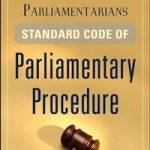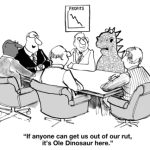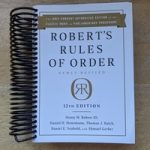Robert’s Rules of Order
Guest post by Weldon L. Merritt, PRP, CPP Note that this review covers the first edition of this parliamentary authority. The American Institute of Parliamentarians has published a second edition, which can be purchased here. Does your organization use Robert’s Rules of Order Newly Revised (RONR) as its parliamentary authority? Do you sometimes feel daunted…
Read MoreDear Dinosaur: In my first year on the city council, I have made several motions which have all failed. My colleagues say, “Don’t make a motion you know will fail because once it fails it cannot be made again.” Is this true? Answer: No, this is wildly wrong. According to Robert’s Rules of Order, during…
Read MoreDear Dinosaur: When a member of our city council says, “I want this on the record!” do we have to include their remarks in the minutes? Answer: Not necessarily. Robert’s Rules says that the purpose of minutes is to record the actions taken by the body. In general, minutes should not include individual remarks. If…
Read MoreDid you know, gentle reader, that if your parliamentary authority is Robert’s Rules of Order, you have already adopted the 12th edition? Here is the quotation from the horse’s mouth: This Twelfth Edition supersedes all previous editions and is intended automatically to become the parliamentary authority in organizations whose bylaws prescribe “Robert’s Rules of Order,”…
Read MoreNonprofit organizations, like many voluntary groups in our country, struggle to locate and recruit adequate leadership. People are living such busy lives, with the demands of work, family, and personal well-being, that they find it a challenge to take on a leadership role. When there is a dearth of candidates to lead an organization—and often…
Read MoreWith fall and the turning of the year, many organizations are struggling over their elections. We can’t do things the way we have always done, so what are the options? Here are a few thoughts on holding elections in this pandemic. As always, this is not legal advice. Be sure to consult your attorney!…
Read MoreThe term “pass the gavel” refers to a situation where the chair of a meeting (the presider, the person running the meeting) temporarily gives up the position of chair (the authority to run the meeting) to allow another person to preside over the meeting. Download PDF Pass the gavel in a large meeting In a…
Read MoreWhat can you do when your colleagues on a board or council say things that you find offensive? What if they are making subjective statements that hurt your feelings? We are living in tough times for civility. People feel free to say things during meetings that can be offensive and challenging. Robert’s Rules of…
Read MoreThe biggest problem we encounter in meeting minutes is too much verbiage. Striving to do justice to their job, secretaries sometimes include the arguments that are made, what people say in response, and all the minutiae of discussion. There is a better way! According to Robert’s Rules of Order, minutes should record what is DONE,…
Read MoreThis article by John R. Berg, PRP, president of the Washington State Association of Parliamentarians (WSAP), was originally published in the August 2020 issue of the Washington State Parliamentarian, the WSAP newsletter. Jurassic Parliament expresses its gratitude to John and to WSAP for permission to reprint. In my previous message I stressed the need to…
Read More









